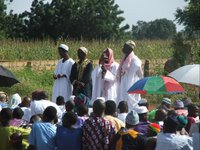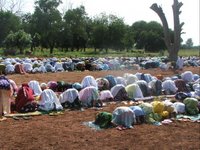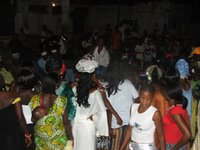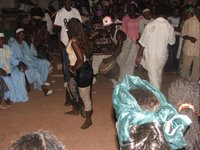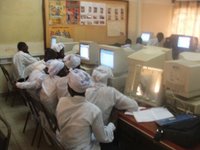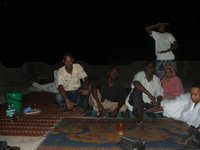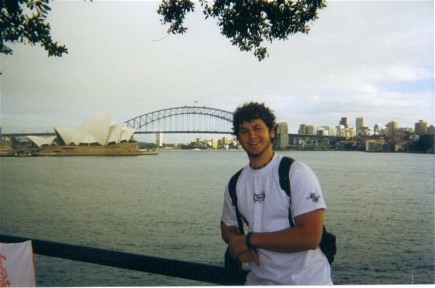West African Music 101
My goal here was to compile a good list of West African musicians and give you an idea of what they're about. Allmusic.com supplied me with most of my information. Most of these became popular between the 60's - 90's. I don't have many newer musicians here because they take a while to break out, or they at least take a while to break out on the internet. Also, much of the music scene in Africa is being dilluted by MTV/BET, so much of the newer music lacks any sort of African identity that it once had. But there is definitely still some great new stuff. About half are recommendations and half are ones I've found on my own. Some I've heard and some I've not. I'm going to try to continuously update this blog entry, so please check back if you're interested in West African music.
I'm reluctantly building a decent tape collection because tapes are the most readily available music format here. However, you can find most of these on CD.
Here's a few good introductory musicians. They're big in American, but ironically, no one has heard of them here:
The Refugee Allstars - Sierra Leone - Refugees that fled to Guinea. Very big in the U.S. right now. They're doing a good sized tour there. Check their tour schedule. Someone recently made an award winning documentary about them. Played at Bonnaroo 2006. I just heard they're opening for Aerosmith for some reason. At least they'll get deserved attention.
Ladysmith Black Mambazo - South Africa - Became popular after collaberating with Paul Simon on his "Graceland" album. African harmony at it's best.
Amadou et Mariam - Mali - Big in Europe and America. Good Intro to African Music. Shorter songs, catchy verses, and to the point. Played at Bonnaroo 2006.
Here's a bunch more. Some I have information on, and some I don't. There are some gems here:
*Baaba Mal - Senegal - Very Popular musician. Combines traditional Fula music with jazz, blues, and pop.
*Daara J - Senegalese Wolof Hip-Hop. Combines reggae, funk, and Cuban music.
*Salif Keita - Mali - combines African, jazz, funk, Europop, and R&B influences. In a review of an album, Rolling Stone wrote, "Keita's voice is remarkable in itself. It's high, bracing purity is heightened by a unique phrasing that combines full-tilt warrior strength, the sensual lilt of the Brazilian samba and Islamic prayer calls." My personal favorite along with Ali Farka Toure.
*Mory Kante - Guinea - Combines old with the new. Played in The Rail Band until rivalry with Salif Keita forced him to quit. Very good at the Kora.
Amadou Bansang Jobarteh - The Gambia - According to Rootsworld, Jobarteh's "music is at once ancient and new, praising the heroes and benefactors of his home and family, telling the history of his people, and doing it within a series of structures that leave room for individual expression through improvisation."
Foday Musa Suso - The Gambia - "Rooted in the meditative folk traditions of his native Gambia, but he also collaborated with similarly omnivorous Western musicians including Bill Laswell, Herbie Hancock, and Philip Glass to fuse West African music with classical minimalism, free jazz, and avant funk." -allmusic.com
*Ali Farka Toure - Mali - Enjoyed much international acclaim during his life. Described as the African "John Lee Hooker" bluesman. Ethnic Fusion/African Folk. Amazing.
Toumani Diabate - Mali - "A master of the kora (21-string West African harp), Toumani Diabaté has brought the traditional music of his native Mali to the attention of an international audience with a series of well-received solo albums and some unlikely, but acclaimed, collaborations." -allmusic.com
*Sekou "Diamond Fingers" Diabate - Guinea - "Diamond Fingers" Diabate is the virtuoso lead guitarist for Bembeya Jazz.
Bembeya Jazz International - Guinea - "Specializing in modern arrangements of Manding classic tunes"
Le Raam Daan - Senegal
Super Diamono - Senegal
*The Rail Band - Mali - Mory Kante and Salif Keita combined early in their careers
*Prince Nico Mbarga - Nigeria - His song "Sweet Mother" was voted the #1 African Song. An oldie but a goodie.
*Manu Dibango - Cameroon
Hi-Life International - Ghana
Ashanti Brothers - Ghana
Nana Ampadu & the African Brothers - Ghana
The City Boys - Ghana
Genesis Gospel Singers - Ghana
Israel Cole - Sierra Leone
Sabannoh 75 - Sierra Leone
Daddy Saj - Sierra Leone - Sierra Leone's current anti-corruption crusader. Often called the "Lyrical Warrior." He even went to jail for a while for releasing an anti-government song called "Corruption." Featured on BBC recently.
Bunny Mac - Sierra Leone
*Oumou Sangare - Mali - "She received much of her attention for writing and singing lyrics that specifically addressed concerns of women in modern West African society, such as the conflict between marriage and personal freedom; not a shocking subject in the Western world, perhaps, but a pioneering one for the popular music of the region." -allmusic.com
*Ismaël Lô - Senegal - "With his smooth multi-textured voice and low-key folky style, he and his 12-piece band play strong, complex, percussion-laden mbalax songs that discuss important topics in Senegal ranging from racism and respect to immigration." -allmusic.com
*Youssou N'Dour - Senegal - According to Rolling Stone, "If any third world performer has a real shot at the sort of universal popularity last enjoyed by Bob Marley, it's Youssou, a singer with a voice so extraordinary that the history of Africa seems locked inside it." A rather bold statement in my opinion, but he's enjoyable.
*Barry Thianguel - Guinea - This is the band I went to in my last post. Apparently, their name gets around The Gambia like the telephone game. I've heard everything from Jango Bari to Barry Changel.
*Denotes I've heard them and I recommend them.
Feel free to make any corrections or additions by posting them.
